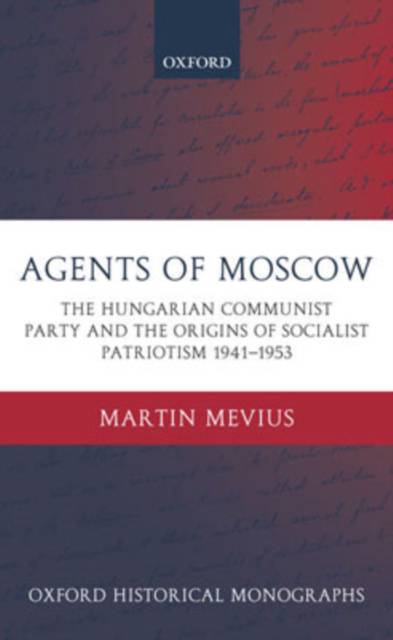
- Retrait gratuit dans votre magasin Club
- 7.000.000 titres dans notre catalogue
- Payer en toute sécurité
- Toujours un magasin près de chez vous
- Retrait gratuit dans votre magasin Club
- 7.000.000 titres dans notre catalogue
- Payer en toute sécurité
- Toujours un magasin près de chez vous
Agents of Moscow
The Hungarian Communist Party and the Origins of Socialist Patriotism 1941-1953
Martin Mevius
426,95 €
+ 853 points
Description
After 1945, state patriotism of the communist regimes in Eastern Europe was characterized by the widespread use of national symbols. In communist Hungary the party (MKP) widely celebrated national holidays, national heroes, erected national statues, and employed national street names. This 'socialist patriotism' had its origin in the 'national line' of the Comintern, established on Soviet instructions following the German invasion of the Soviet Union. At that time Stalin called the parties of the Comintern to oppose the Germans by issuing the call for national liberation. This policy continued after 1945 when, as an aid in the struggle for power, the MKP presented itself as both the 'heir to the traditions of the nations' and the 'only true representative of the interest of the Hungarian people'. Paradoxically however, the Soviet origins of the national line were also one of the main obstacles to its success as the MKP could not put forward national demands if these conflicted with Soviet interests. Martin Mevius' pioneering study reveals that what had started as a tactical measure in 1941 had become the self-image of party and state in 1953 and that the ultimate loyalty to the Soviet Union worked to the detriment of the national party - the MKP never rid itself of the label 'agents of Moscow'.
Spécifications
Parties prenantes
- Auteur(s) :
- Editeur:
Contenu
- Nombre de pages :
- 312
- Langue:
- Anglais
- Collection :
Caractéristiques
- EAN:
- 9780199274611
- Date de parution :
- 07-04-05
- Format:
- Livre relié
- Format numérique:
- Genaaid
- Dimensions :
- 140 mm x 216 mm
- Poids :
- 544 g







